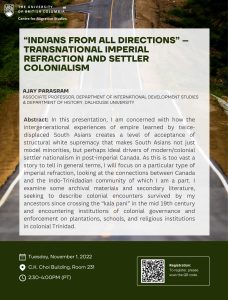“Indians From All Directions” – Transnational Imperial Refraction and Settler Colonialism


The CMS Migration & Indigeneity Research Group is delighted to invite you to its first in-person speaker event in fall 2022.
Speaker: Ajay Parasram (Associate Professor, Department of International Development Studies & Department of History, Dalhousie University)
Abstract: In this presentation, I am concerned with how the intergenerational experiences of empire learned by twice-displaced South Asians creates a level of acceptance of structural white supremacy that makes South Asians not just model minorities, but perhaps ideal drivers of modern/colonial settler nationalism in post-imperial Canada. As this is too vast a story to tell in general terms, I will focus on a particular type of imperial refraction, looking at the connections between Canada and the Indo-Trinidadian community of which I am a part. I examine some archival materials and secondary literature, seeking to describe colonial encounters survived by my ancestors since crossing the “kala pani” in the mid 19th century and encountering institutions of colonial governance and enforcement on plantations, schools, and religious institutions in colonial Trinidad.
I argue that the processes that colluded to break our connection to our traditional lands and land-based practices is precisely what helped to condition us to be “model minorities.” This has significance for scholars interested in migration, indigeneity, and decolonization for two reasons: 1.) it helps to describe lateral racial violence as a symptom of intergenerational trauma, and 2.) suggests that if the break with migrants’ land-based and ontologically distinct forms of knowledge makes us susceptible to internalizing white supremacy, then discovering ways to reconnect with it in a good way may build up the racial resilience of racialized people such that we find in one another solidarity instead competition. I see this as a necessary therapy for intergenerational colonial healing in this still-colony, with significance well beyond the Indo-Trinidadian community.
Registration:
The registration is now closed.
